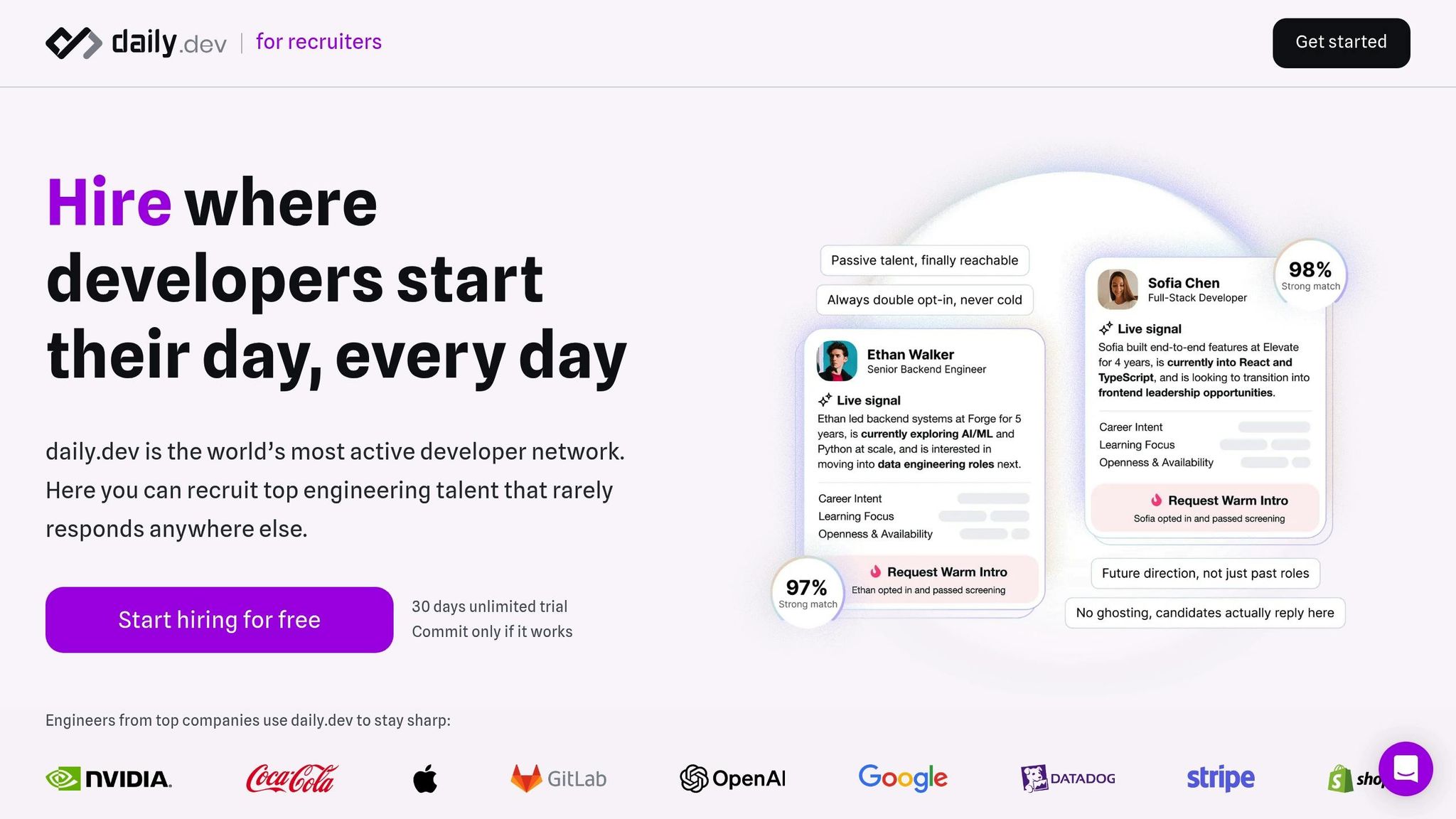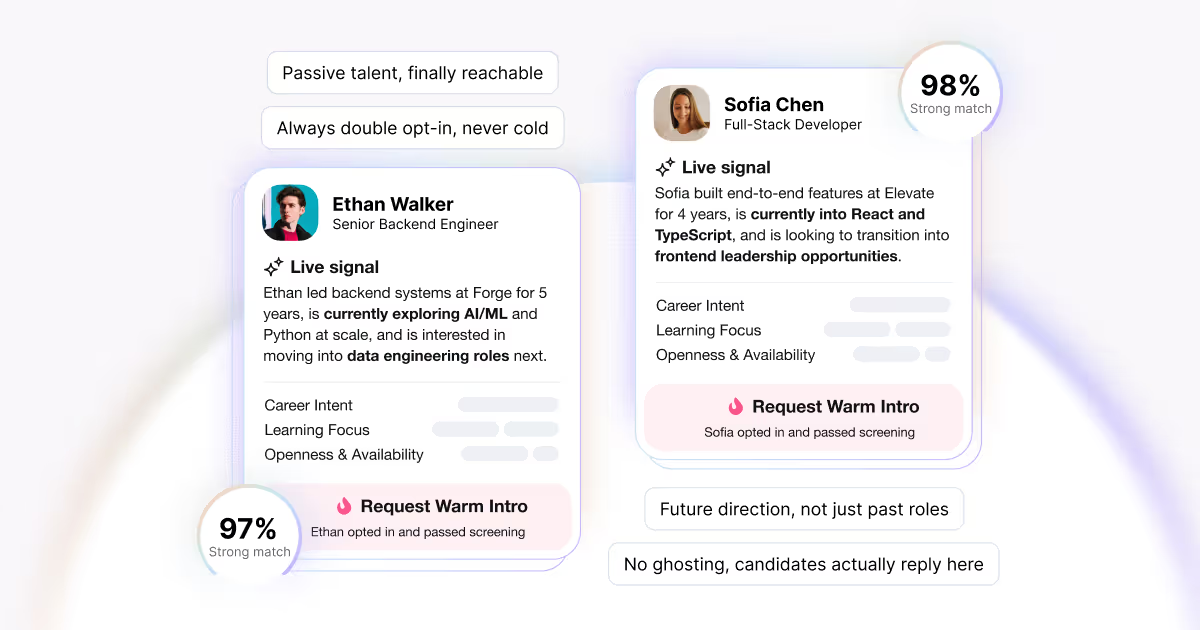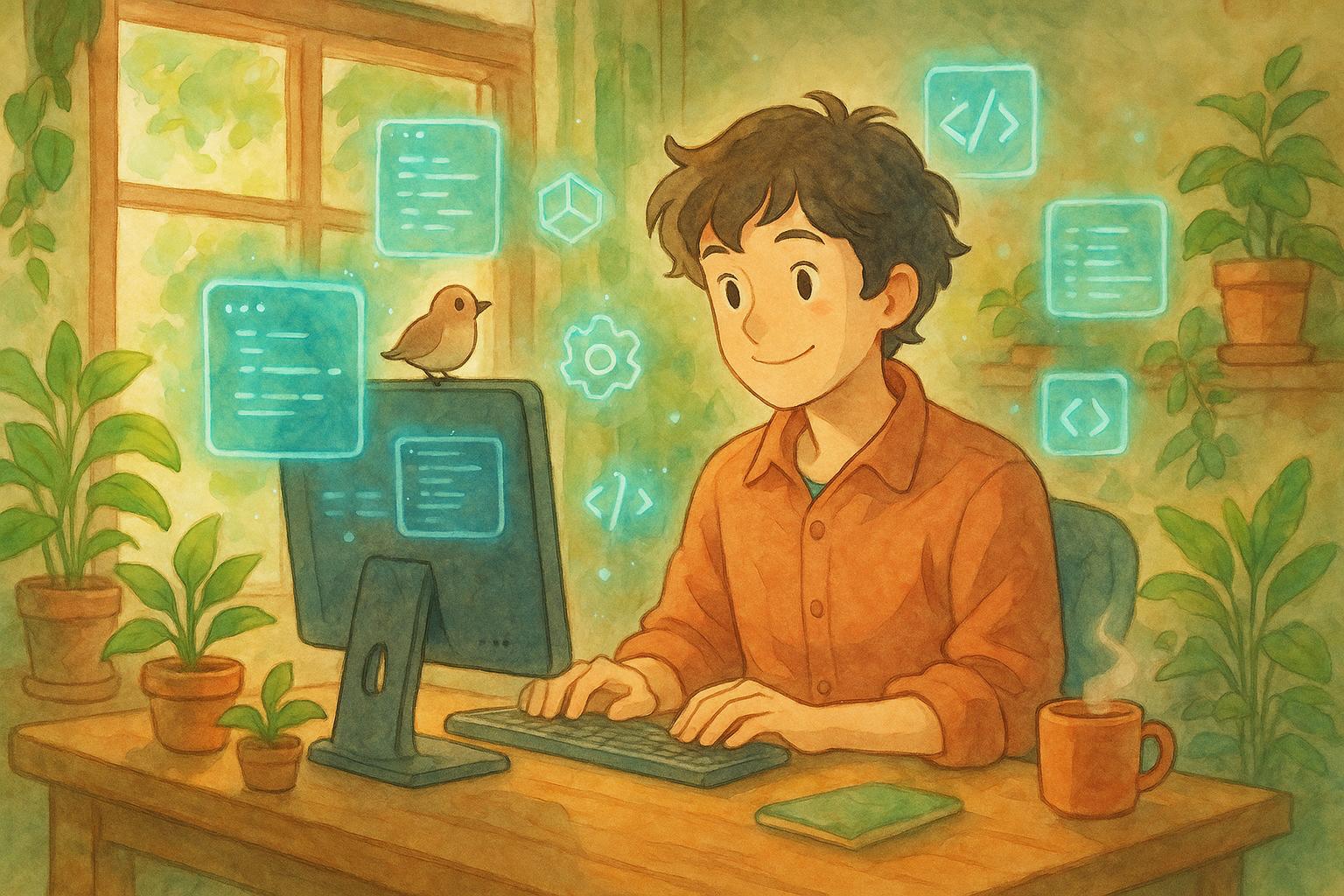


Learn how to cultivate lasting relationships with developers through trust, clear communication, and personalized interactions.
Building lasting relationships with developers is about trust, respect, and clear communication. Instead of relying on cold outreach, focus on meaningful, personalized interactions that align with their goals and interests. Here’s how to do it:
- Start with trust: Tailor your first message by referencing their work and providing specific job details. Avoid generic or vague outreach.
- Use developer-friendly platforms: Tools like daily.dev Recruiter ensure warm, two-way introductions, reducing friction and improving response rates.
- Write clear job descriptions: Highlight the technical challenges, tools, and decision-making processes. Be transparent about pay and expectations.
- Maintain regular contact: Share relevant updates, industry trends, or opportunities that match their interests.
- Recognize contributions: Celebrate milestones and provide specific, personalized feedback.
- Listen and improve: Act on feedback to refine your approach and show developers you value their input.
Relationship Recruiting in the Age of AI with Russell Weaver
First Contact: Earning Trust Right Away
Your first message sets the tone, and it counts. Developers often get lots of common, ready-made messages, so yours needs to shine with real effort and care. Show them you care about what they do and their career goals.
Tailored Talk
Take time to know about the developer's work, on GitHub, personal blogs, or other sites, and talk about something clear. Instead of a broad, "I have a cool job for you", try, "I saw your work with the React tool kit for online shops - it’s great! We're facing similar stuff with our checkout, and I think your skills would fit well."
Keep your words short and to the point. Developers like it clear, so add main details like the job, the tech problems, and why they’d fit. Save talk about work life for later chats.
Timing counts too - sending notes mid-week may help get better replies.
Picking Developer-First Spots
After making a tailored message, think about where to reach out. Old ways may feel too much, especially to developers who get too many recruiter messages. Platforms like daily.dev Recruiter offer a smoother way to meet.
With its double opt-in system, developers on daily.dev Recruiter are open to hear about new roles, ensuring that your message is not out of the blue or unwelcome. This paves the way for a smoother, more welcome intro.
When developers see jobs through daily.dev Recruiter, they are in a known and trusted space, full of tech talk and industry chat. This makes your message seem less like spam and more part of their job path.
This caring and mindful method starts the process of making job ads that really speak to developers.
Making Developer-Friendly Job Descriptions
When creating job ads, focus on what developers prize most: the tech puzzles and chances to grow. Begin by showing the problems they’ll solve rather than listing perks.
Be clear about the tech used. Developers seek clarity - list the real tools, and tech they will use (like React 18, Python 3.11, Kubernetes). Skip the buzzwords and vague terms.
Point out how tech choices are made. Will they have a say in design? Are there code reviews? How do you handle tech debt? These bits show you get what holds a developer's interest in a job.
Also, be open about pay. Whether it’s a clear span or note about market rates, upfront pay info builds trust and shows respect for their time.
Every part of this process, from tailored messages to detailed job ads, starts with trust in recruiting developers.
Keeping the Spark: Making Lasting Bonds
First talks may start things, but it takes real work to keep up a bond that keeps us set for the future.
Regular Talks and Smart Content Share
Headhunters shine by caring more about true talk than just dropping job offers. Think of what matters in their day. Send them news on new tech, ask them to a talk, or show them new trends. Each talk should add worth.
Each month, catch up to see how they grow. Ask what projects pump them up, what new things they're picking up, or what tough stuff they’re on. These talks not just keep your link strong but also give you deep clues for the road ahead.
When you share things, make them fit and close to heart. Say a coder likes machine learn, forward them a cool study or a talk. If you find an open-source work that fits their love, send it with a note on why it struck you.
Time it right, too. Reach out midweek to dodge busy times and make sure your words stand out. These smart, well-set talks help build solid bonds.
Making a Group and Pushing Team Work
Coders do best when they meet others and work together on what drives them. By making these chances, you not just up your bond but also help their work life.
Think about online gatherings or talks on hot topics. Even simple coffee meets for coders in like roles can spark great links. When coders tie these good times to you, they will trust what you offer more.
Hooking up mentors is great for good vibes. Old hands like to share what they know, and new ones want to learn. By making these ties, you show you get the big coder world, not just hiring.
Small, tight doings like code checks or tech classes hit well too. They don’t all have to be big shows - often, the best talks are in small, snug spots.
Using sites like daily.dev Recruiter helps you mix with coders where they live their tech lives. By joining talks, sharing views, and adding to chats on trends, you earn trust in a space coders love.
Hearing Out and Using What You Learn
Being there isn't just about reaching out - it’s about hearing and getting better. When coders talk about how you reach out, your job posts, or the shots you offer, listen and make it count.
Set up easy ways to get feedback from each coder. Whether it’s a fast email or a set form matters less than how ready you are to change from what they say.
Look for signs in the feedback you get. If many coders say your job posts miss tech details, work more on them. If they like texts more than calls, change how you reach out. It's key to show you hear them and are ready to shift.
When coders give detailed tips - like how to show pay info or the best times to call - try their ideas and tell them how it went. This shows you rate their skills and take what they say to heart.
Writing down their likes is key too. Some coders might like updates every three months, others every month. Some enjoy deep tech talks, while others like simple news. Fitting your way to their likes shows you care for their time and what they care about.
sbb-itb-d1e6221
How Developer-First Tools Help in Building Connections
Developer-first tools take custom reach-outs and ongoing talks to a new level. They make every step of hiring - from first meet to long talks - easier. Let’s look at why these tools work so well.
Key Things about daily.dev Recruiter

Warm intros change the game. With daily.dev Recruiter's two-way choice system, all talks start with both sides interested. This means talks begin well, not with the weirdness or push-back of cold calls.
This tool’s high reply rates come right from this setup. Developers who see job offers through daily.dev Recruiter are already into the tool’s group and stuff. Your note isn’t a shock - it’s waited for.
Smart targeting lets you meet developers based on what they really can do and like, not just old CV words. You get to pick by code language, work years, business type, and the tech they use now.
The ATS link keeps all talks and likes well in line with your Applicant Tracking System. So, when you reach out after months, you will know well what was said or liked before.
Set screening needs make it simple to match developers to roles that fit both in tech and personal ways. This saves time for all and makes sure you get the right fits.
Taking Care of Developer Privacy and Choices
Daily.dev Recruiter gives clarity and control to developers. They know just what info you see and how you found them. No secret lists or stolen profiles - just clear, true talks.
Developer control is key. The tool lets developers set when they can talk, how they like to be reached, and what job offers they want. By caring for these choices, you act more as a partner than a bother.
With privacy built in, developers don't feel at risk. They choose when to talk, what to share, and how often they hear from you. This kind of control builds trust from the start.
The tool’s no-spam promise helps both sides. Since every link needs choices from both, developers trust that notes are real offers, not just bulk mails.
How It Changes Hiring Outcomes
These privacy-focused things don’t just build trust - they also bring better hiring results. Trust-led links better key numbers overall. Firms using daily.dev Recruiter see higher reply rates, better candidate quality, and stronger ties with their developer groups.
Less screening time happens when intros are warm and made just right. Meanwhile, better staying comes from developers feeling valued and cared for through the hiring steps. They join talks ready and keen, boosting their stay for the long run.
The relations-first way makes a big ripple. Happy developers refer others, talk about their good times, and stand as voices for your firm. One good link often leads to many chances through their circles.
At last, sure results take the place of the old guess game in hiring. Now, you don't just hope your calls hit the mark. You can be sure that every developer you reach out to is ready to listen to you.
Feedback and Recognition: Strengthening Long-Term Relationships
Building trust with developers isn’t just about the initial connection - it’s about nurturing that trust over time. Consistent feedback and meaningful recognition are key to maintaining strong, long-lasting relationships.
Regular Feedback Cycles
Regular feedback is a game-changer for developer relationships. Don’t wait for annual reviews or the end of a project to check in. Instead, schedule regular touchpoints - every few weeks or months - to discuss growth, career goals, and performance. These conversations show that you’re invested in their success.
Feedback should be a two-way street. Take the time to ask developers about their experiences, challenges, and the support they need. This not only helps you understand their aspirations but also uncovers opportunities for growth.
Even if you’re not actively hiring, maintaining these check-ins keeps the relationship alive. Use them to explore their satisfaction with their current role, their interest in developing new skills, or their long-term career plans.
Transparency is essential during these discussions. Be upfront about expectations, timelines, and any potential hurdles. This clarity helps build trust and prevents small issues from escalating into bigger problems.
Beyond guiding growth, regular feedback lays the foundation for meaningful recognition.
Recognizing Developer Contributions
Recognition is more than just a quick “great job” after a project is completed. It’s about understanding what matters to each developer and celebrating their unique contributions in a way that feels personal and impactful.
Some developers thrive on public acknowledgment during team meetings or company-wide events, while others may prefer a private thank-you or detailed written feedback they can add to their portfolio. The key is understanding their preferences and tailoring your recognition accordingly.
Be specific in your praise. Instead of a generic “nice work on the project,” say something like, “Your creative approach to optimizing our database queries has noticeably improved system performance and enhanced the user experience.” Specificity shows that you genuinely see and value their efforts.
Don’t overlook important milestones, such as work anniversaries, project launches, or certifications. Remembering these moments shows that you see developers as individuals, not just as contributors to your team. Using a CRM system to track these details can help ensure you never miss a chance to celebrate their achievements.
Thoughtful recognition naturally leads to ongoing conversations that strengthen the relationship.
Continuous Improvement Through Communication
Open and honest communication is the backbone of any strong partnership. Create an environment where developers feel comfortable sharing their thoughts about processes, challenges, and areas for improvement.
"Long-term client partnerships are built on trust, proactive communication, and continuous value." - David Ward, Technologist, Marketer, and Serial Entrepreneur
When developers see their feedback leading to real changes, it builds trust and encourages further engagement. Let them know their input made a difference - it reinforces the idea that their voice matters.
Providing ongoing value also strengthens the relationship. Share industry insights, career development tips, or networking opportunities that align with their goals. These small but meaningful gestures position you as a trusted advisor, not just another business contact.
Finally, follow through on your promises. If you say you’ll check back in two weeks or share a helpful resource, make sure you do it. Consistency in even the smallest actions builds confidence and lays the groundwork for a successful, long-term partnership.
Conclusion: Building Trust-Driven Developer Relationships
Building long-term relationships with developers isn’t just about filling roles - it’s about creating a sustainable pipeline of talent. Trust is the cornerstone of transforming one-off transactions into meaningful partnerships. When developers feel that you truly understand their goals, respect their time, and care about their career growth, they become more than candidates. They turn into advocates - referring other skilled developers and staying connected with your organization over time.
Adopting a developer-first approach means focusing on genuine, value-driven interactions rather than sales tactics. Tools like daily.dev Recruiter help facilitate authentic, double opt-in introductions. Instead of relying on cold outreach, which often feels intrusive, these connections are formed naturally in spaces where developers are already active - whether they’re reading industry articles, learning new skills, or joining professional discussions. This ensures every interaction begins on a foundation of mutual respect and shared interests.
The benefits of this trust-first approach go well beyond individual hires. When you consistently show that you see developers as people, not just resources, you build a reputation that naturally attracts top talent. Developers are more likely to refer peers and engage with your organization when they know you value them for more than their technical skills.
Relationship building takes time, but it’s worth the investment. The developer who isn’t ready to make a move today could be the ideal candidate six months down the line. Every successful placement strengthens your network, creating opportunities for referrals and shared insights. Each positive interaction adds another layer to a foundation of trust.
"Long-term client partnerships are built on trust, proactive communication, and continuous value." – David Ward, Technologist, Marketer, and Serial Entrepreneur
FAQs
How can I craft an outreach message that developers will trust and respond to?
To write an outreach message that resonates with developers, focus on personalization and making it relevant to them. Reference something specific about their recent work, skills, or interests - this shows you’ve taken the time to understand who they are and what they do. Generic messages won’t cut it here; a tailored approach makes it clear why you’re reaching out to them in particular.
Be upfront about your intentions and keep your message short and to the point. Developers appreciate straightforward communication, so explain how the opportunity connects to their expertise or goals. Trust begins with genuine interest and offering something of value, rather than simply asking for their time or effort. A carefully thought-out message can be the key to sparking a meaningful conversation.
How can using developer-focused platforms like daily.dev Recruiter help build lasting relationships with developers?
Using platforms like daily.dev Recruiter can transform the way recruiters connect with developers. These tools focus on building genuine, long-term relationships by emphasizing trust and relevance. They link recruiters with active, pre-qualified developers who are already participating in their professional community, making every interaction feel more meaningful.
By leveraging warm, double opt-in introductions, these platforms eliminate the need for cold, impersonal outreach. This not only streamlines the process but also fosters connections based on mutual interest and respect, creating stronger and more effective relationships with developers.
How does regular feedback and recognition help build stronger relationships with developers?
Recognizing and giving feedback regularly plays a big role in building trust and maintaining strong relationships with developers. Constructive feedback helps them sharpen their skills, see the impact of their work, and tackle any challenges that come their way. On the other hand, showing appreciation for their contributions keeps them motivated and engaged.
By consistently acknowledging their efforts and keeping communication open, developers feel appreciated and more connected to the team. This kind of positive interaction fosters a collaborative atmosphere, reinforcing respect and loyalty over time.






